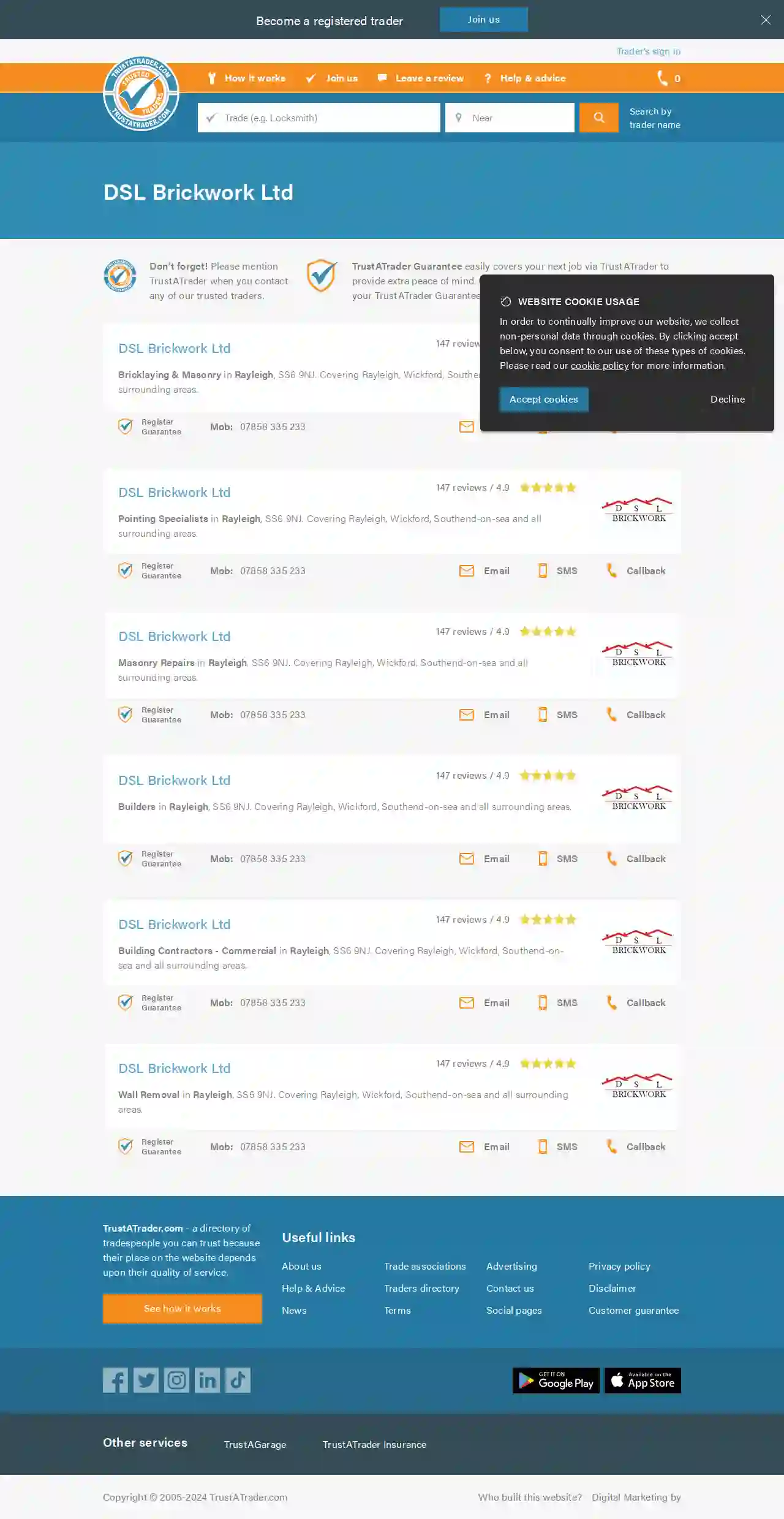Excavation Contractors Rayleigh
Find the best Excavation Companies in Rayleigh
Get up to 3 Excavating Contractor quotes for your project today! Compare profiles, reviews, accreditations, portfolio, etc... and choose the best deal.
- Lo
Lord Rayleigh's Farms Ltd
3.33 reviewsRayleigh, GB- Services
- Why Us?
Get Quote - LK
LKK Solution Services Ltd
54 reviewsRayleigh, GB- Services
- Why Us?
Get Quote - Ma
Man With Digger
42 reviewsRayleigh, GB- Services
- Why Us?
Get Quote - AJ
AJ CONSTRUCTION ESSEX LTD
58 reviewsRayleigh, GB- Services
- Why Us?
Get Quote - Ca
Canterbury Construction Ltd
51 reviewsRayleigh, GB- Services
- Why Us?
Get Quote 
DSL Brickwork
1.56 reviewsRayleigh, SS6 9NJ, GBDSL Brickwork Ltd DSL Brickwork Ltd is a trusted and reliable bricklaying and masonry company based in Rayleigh, Essex. They offer a wide range of services, including bricklaying, pointing, masonry repairs, building, and building contracting. They are known for their high-quality workmanship and commitment to customer satisfaction. DSL Brickwork Ltd has been serving the Rayleigh area for many years and has built a strong reputation for their professionalism and expertise. They are fully insured and accredited, giving you peace of mind that your project is in safe hands. Services Offered Bricklaying & Masonry Pointing Specialists Masonry Repairs Builders Building Contractors - Commercial Wall Removal Areas Covered DSL Brickwork Ltd covers Rayleigh, Wickford, Southend-on-sea and all surrounding areas. Contact Information Mob: 07858 335 233
- Services
- Why Us?
- Gallery
Get Quote- So
Soilfix
1Rayleigh, GB- Services
- Why Us?
Get Quote - Na
Narbuild Excavation
1Rayleigh, GB- Services
- Why Us?
Get Quote - Di
Diggins & Co Estate Agents Rayleigh
4.629 reviewsRayleigh, GB- Services
- Why Us?
Get Quote - Ra
Rayleigh Drainage - Blocked Drains
53 reviewsRayleigh, GB- Services
- Why Us?
Get Quote
Over 11,537+ Excavation Companies onboarded
Our excavation experts operate in Rayleigh and surroundings!
ExcavationHQ has curated and vetted Top Excavation Contractors in Rayleigh. Find a trustworthy contractor today.
Frequently Asked Questions About Excavation Contractors
- Project Size and Scope: Larger, more complex excavations naturally take longer.
- Soil Conditions: Rocky or challenging soil types can slow down progress.
- Site Accessibility: Limited access might require more time for maneuvering equipment and hauling materials.
- Weather: Inclement weather can cause delays.
- Permitting and Inspections: Waiting for permits or inspections can extend the timeline.
- Clearly Define the Scope: Outline the project's goals, including the excavation area, depth, grade, and intended use.
- Obtain Necessary Permits: Research and acquire any required permits from your local authorities.
- Mark Utility Lines: Contact your utility companies to locate and mark underground utilities to prevent damage.
- Communicate with Neighbors: Inform your neighbors about the project's timeline and potential noise or disruptions.
- Prepare the Site: Clear any obstacles, such as vegetation, furniture, or structures, from the excavation area.
- Discuss Safety Protocols: Review safety procedures with the contractor to ensure a safe work environment.
How long does an excavation project take?
What is the difference between cut and fill excavation?
Cut: Involves excavating soil from an area where the existing grade is higher than the desired grade.
Fill: Refers to using the excavated soil ('cut' material) to raise the grade in an area where the existing grade is lower than desired.
This method minimizes the need to import or export soil, reducing costs and environmental impact. It's commonly used for site preparation, road construction, and landscaping.
What should I do before excavation starts?
What is the difference between topsoil and subsoil?
Topsoil: The uppermost layer, typically rich in organic matter, nutrients, and microorganisms. It's essential for plant growth and is often darker in color.
Subsoil: The layer beneath the topsoil, containing less organic matter and generally denser. It provides support for roots but is less fertile than topsoil.
During excavation, topsoil is often removed and preserved separately for later use in landscaping, while subsoil is typically used for backfilling or other less demanding applications.
How long does an excavation project take?
- Project Size and Scope: Larger, more complex excavations naturally take longer.
- Soil Conditions: Rocky or challenging soil types can slow down progress.
- Site Accessibility: Limited access might require more time for maneuvering equipment and hauling materials.
- Weather: Inclement weather can cause delays.
- Permitting and Inspections: Waiting for permits or inspections can extend the timeline.
What is the difference between cut and fill excavation?
Cut: Involves excavating soil from an area where the existing grade is higher than the desired grade.
Fill: Refers to using the excavated soil ('cut' material) to raise the grade in an area where the existing grade is lower than desired.
This method minimizes the need to import or export soil, reducing costs and environmental impact. It's commonly used for site preparation, road construction, and landscaping.
What should I do before excavation starts?
- Clearly Define the Scope: Outline the project's goals, including the excavation area, depth, grade, and intended use.
- Obtain Necessary Permits: Research and acquire any required permits from your local authorities.
- Mark Utility Lines: Contact your utility companies to locate and mark underground utilities to prevent damage.
- Communicate with Neighbors: Inform your neighbors about the project's timeline and potential noise or disruptions.
- Prepare the Site: Clear any obstacles, such as vegetation, furniture, or structures, from the excavation area.
- Discuss Safety Protocols: Review safety procedures with the contractor to ensure a safe work environment.
What is the difference between topsoil and subsoil?
Topsoil: The uppermost layer, typically rich in organic matter, nutrients, and microorganisms. It's essential for plant growth and is often darker in color.
Subsoil: The layer beneath the topsoil, containing less organic matter and generally denser. It provides support for roots but is less fertile than topsoil.
During excavation, topsoil is often removed and preserved separately for later use in landscaping, while subsoil is typically used for backfilling or other less demanding applications.